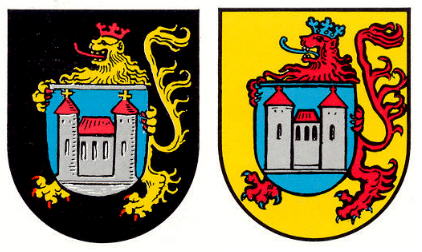Münsterappel: Difference between revisions
Knorrepoes (talk | contribs) m (Text replace - "[[Literature" to "{{media}} [[Literature") |
Knorrepoes (talk | contribs) m (Text replace - "{|width="100%" style="color:black; background-color:#ffffcc;" |width="15%"|50 px|left |width="70%" align="center" |'''Heraldry of the World<br/>Civic heraldry of Germany - [[Deutsche Wappen|Deutsche Wappen (Gemeind) |
||
| Line 1: | Line 1: | ||
{ | {{de}} | ||
'''MÜNSTERAPPEL''' | '''MÜNSTERAPPEL''' | ||
Revision as of 11:12, 25 January 2015
This page is part of the German heraldry portal Deutsche Wappensammlung |
Heraldry of the World |
|
German heraldry:
|
Selected collector's items from Germany:
|
MÜNSTERAPPEL
State : Rheinland-Pfalz
District (Kreis) : Donnersbergkreis (until 1969 Rockenhausen)
Verbandsgemeinde : Verbandsgemeinde Alsenz-Obermoschel
Official blazon
In Gold ein blaubewehrter, -bezungter und -bekrönter roter Löwe einen blauen Schild haltend, darin eine zweitürmige rotbedachte silberne Kirche (Münster).
Origin/meaning
The arms (above right) were officially granted on July 4, 1953. The arms above left were never officially granted, but were in use until 1953.
The arms are based on the oldest known seal of the village, dating from 1537. The church is the local church (Münster), which was owned by the St. Maximinius Abbey in Trier, which also owned a large part of the area in late medieval times. Their possessions later became owned by the Rheingrafen ('Counts of the Rhine'), who partially gave the area in loan to the counts of the Pfalz.
The golden lion in black is the lion of the Pfalz, the red lion in gold, the arms of the Rheingrafen. As the seal was made at a time when the area was primarily ruled by the Rheingrafen, the arms were granted in 1953 with their arms.
Contact and Support
Partners:
Your logo here ?
Contact us
© since 1995, Heraldry of the World, Ralf Hartemink 
Index of the site
Literature : Debus, 1988.












